Physical Address
304 North Cardinal St.
Dorchester Center, MA 02124
Physical Address
304 North Cardinal St.
Dorchester Center, MA 02124
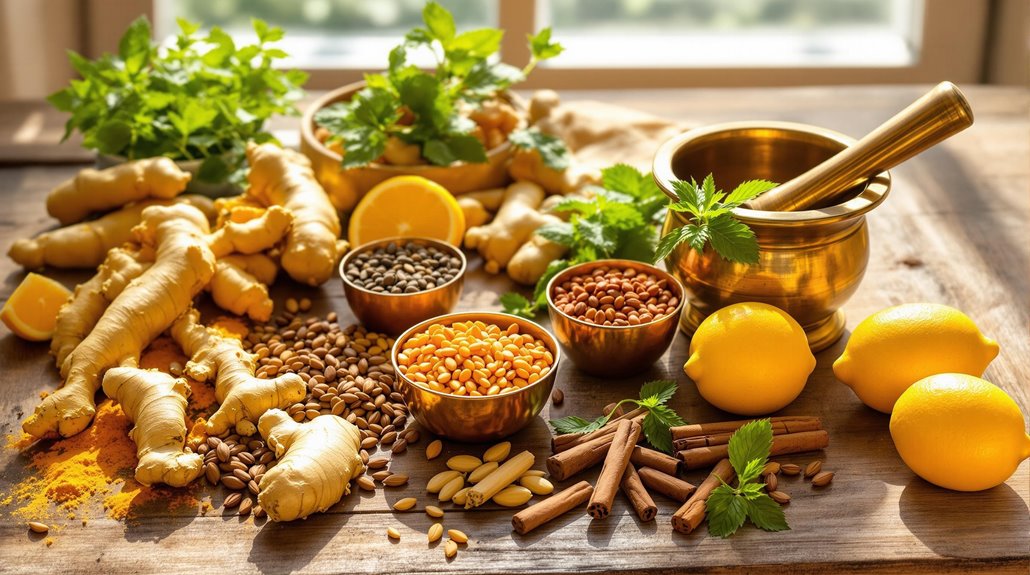
Find your unique path to wellness through Ayurvedic nutrition, where ancient wisdom meets modern health solutions and personalized healing begins.
Ayurvedic nutrition offers a personalized approach to wellness based on your unique body type, or dosha. You'll discover how to balance your meals with six essential tastes while incorporating powerful herbs like turmeric and ashwagandha. By following key principles of timing and food combinations, you can enhance digestion and boost overall health. From mindful eating practices to modern applications, this ancient wisdom seamlessly adapts to your contemporary lifestyle, revealing deeper insights into ideal nutrition.
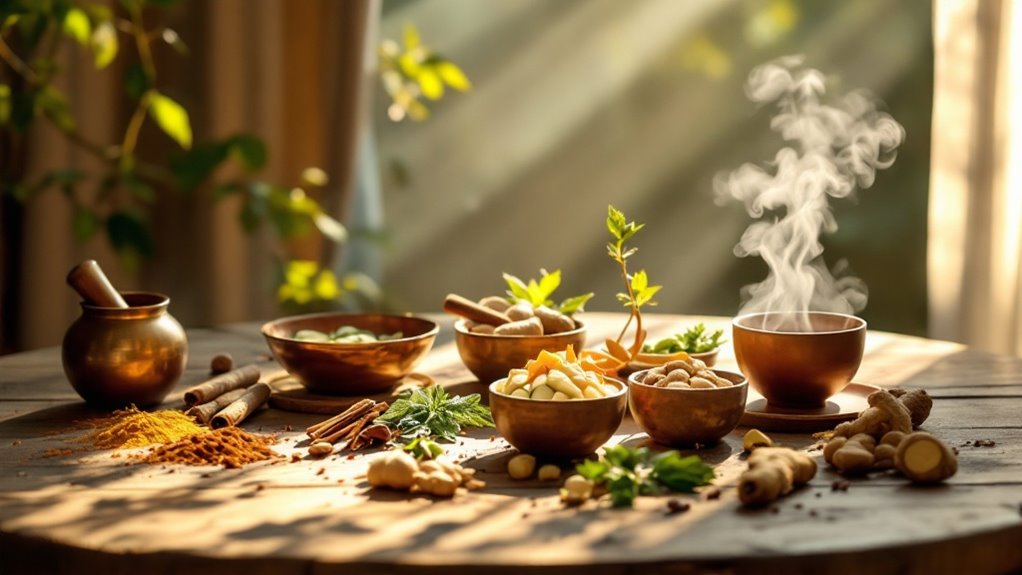
When it comes to understanding your unique body type and maintaining ideal health, Ayurvedic medicine offers a fascinating framework through the concept of three doshas: Vata, Pitta, and Kapha.
Each dosha represents distinct energy patterns that influence everything from your physical appearance to your personality traits. These patterns fluctuate with seasons and daily cycles, affecting how you feel and function throughout the year.
If you're primarily Vata, you'll likely have a slim build with dry skin and a creative mind, though you might struggle with anxiety.
Pitta types tend to be medium-built with warm skin and sharp intellects, while Kapha individuals usually have sturdy frames, thick hair, and naturally calm dispositions.
Your dominant dosha isn't just about physical characteristics – it's a blueprint for understanding your metabolism, emotional tendencies, and how to maintain balance in your daily life.
Understanding your dosha is just the beginning of your Ayurvedic journey – now it's time to explore how to nourish your unique constitution through mindful eating practices.
By incorporating all six tastes (sweet, sour, salty, bitter, pungent, and astringent) into your meals while prioritizing those that balance your dominant dosha, you'll create harmony within your body. Include digestive spices like ginger, cumin, and fennel to strengthen your digestive fire.
Fresh, seasonal, and local foods should form the foundation of your diet, as they're packed with prana (vital energy) and naturally align with your environment.
When you sit down to eat, find a quiet space away from screens, chew thoroughly, and listen to your body's signals.
Fill your plate following the 50-25-25 rule: half solids, quarter liquids, and quarter empty space, and remember – that first burp isn't just nature's way of saying "thanks for dinner," it's your cue to stop eating!
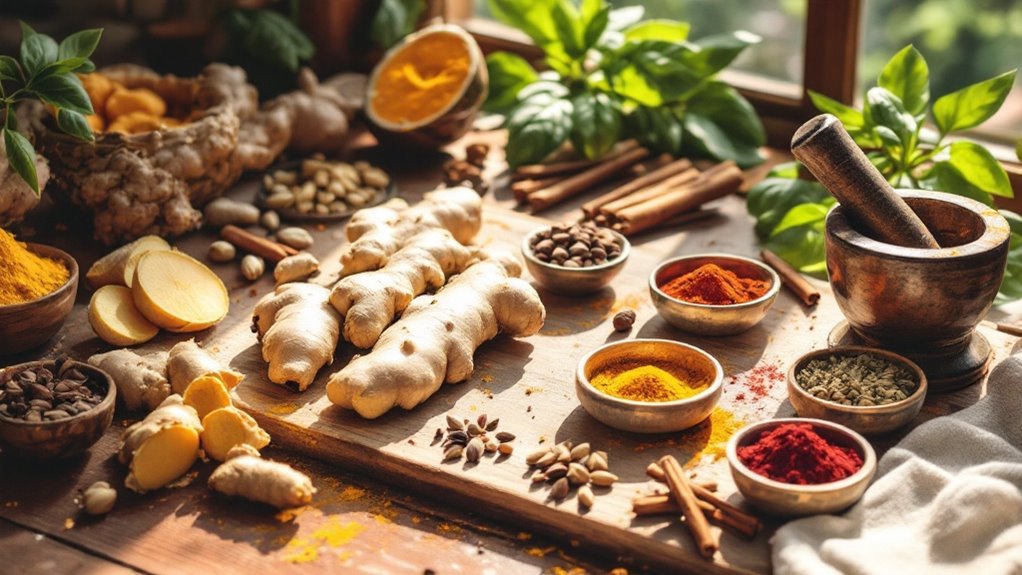
Through the vibrant world of Ayurvedic herbs and spices, you'll discover nature's most potent healing agents – each offering unique therapeutic benefits for your mind and body.
While turmeric and ginger fight inflammation, your digestive system gets a boost from cumin and fennel seeds. You'll find ashwagandha and brahmi working wonders for stress relief, while neem and triphala excel at detoxification. Adding these spices helps eliminate harmful toxins and ama from your system.
For immune support, you can't go wrong with tulsi and amla – they're powerhouses for fighting pathogens and boosting your natural defenses.
Think of these herbs as your body's maintenance crew: turmeric's curcumin tackles inflammation, cardamom lifts your mood, and shatavari helps keep your stress hormones in check.
It's like having a natural pharmacy right in your kitchen!
The masterful use of herbs and spices in Ayurvedic cooking sets the stage for another essential aspect of this ancient wisdom: the art of meal timing and food combinations.
You'll achieve peak digestion by aligning your meals with your body's natural rhythms – enjoying your largest meal between 12 p.m. and 2 p.m. when your digestive fire (Agni) peaks. For breakfast, aim for 7-9 a.m., and wrap up dinner by 7 p.m. to prevent that uncomfortable "food baby" feeling before bed.
When it comes to food combinations, you'll want to avoid mixing dairy with sour fruits or fish – unless you're fond of digestive drama! Understanding your unique dosha constitution helps determine the most beneficial food combinations for your body type.
Instead, balance your meals with all six tastes and pair heavy proteins with lighter vegetables. Remember, your digestive fire isn't a fan of ice-cold beverages during meals, so stick to warm drinks.
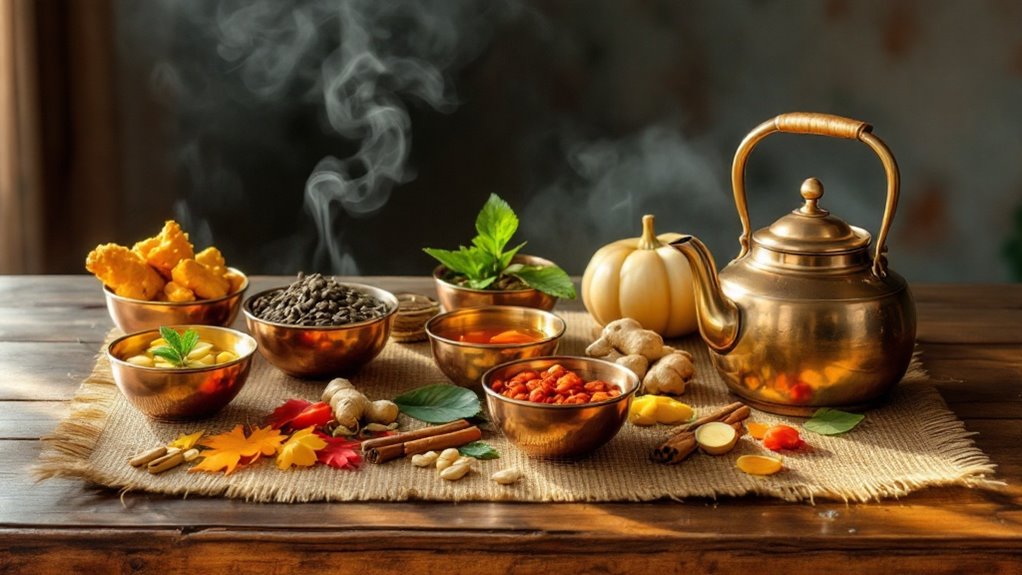
As seasons shift and nature's rhythms change, your body craves different foods to maintain ideal balance.
Your body instinctively knows what it needs as the seasons change, seeking nourishment that aligns with nature's eternal dance.
Ritucharya practices help prevent common seasonal ailments by aligning your diet with nature's cycles.
You'll want to adapt your diet with warming stews and root vegetables during fall and winter's Vata season, while summer's Pitta season calls for cooling foods like cucumbers and melons.
When spring's Kapha season arrives, lighten things up with pungent foods like radishes and leafy greens.
Don't forget to support these seasonal changes with helpful herbs – a cup of ginger tea during monsoon season can work wonders for your digestion, while cinnamon-infused drinks keep you toasty in winter.
Beyond adapting your diet to seasonal changes, mindful eating practices form the cornerstone of ideal digestive health in Ayurveda.
You'll maximize nutrient absorption and enhance your digestive fire (Agni) by chewing thoroughly and savoring each bite, while eating in a calm, screen-free environment lets you tune into your body's natural hunger signals.
When you're enjoying your meals, sit upright and express gratitude – this activates your parasympathetic nervous system, optimizing digestion. Including all six tastes in your meals helps create balance and satisfaction.
Take a mindful approach by making lunch your largest meal, maintaining 3-6 hour gaps between meals, and opting for lighter dinners.
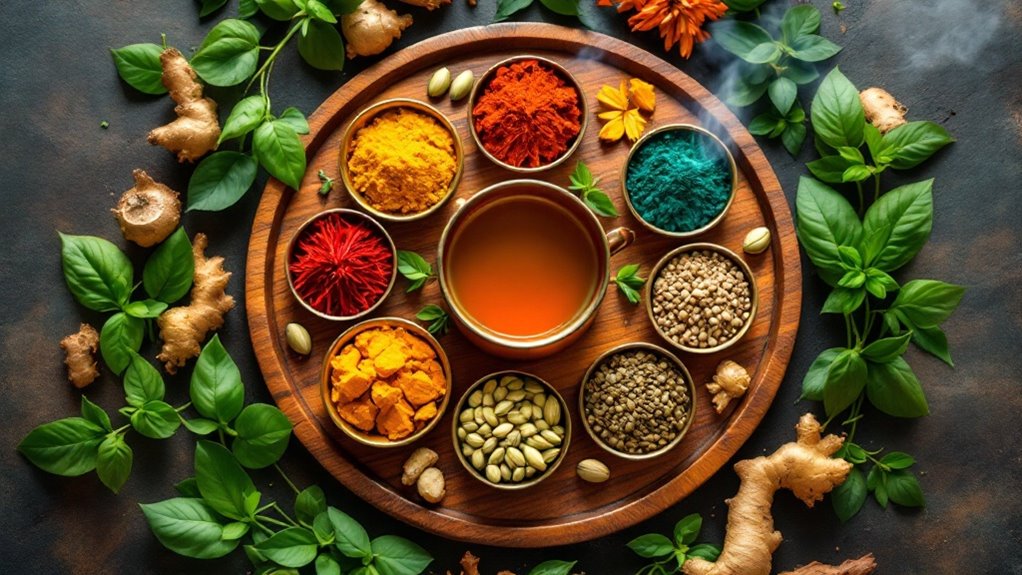
Modern scientific research continues to validate ancient Ayurvedic dietary wisdom, with personalized nutrition plans now backed by clinical studies showing impressive weight loss results.
You'll find cutting-edge mobile apps using AI to analyze your unique traits and create customized dosha-based meal plans, while major corporations are catching on to these time-tested principles.
Today's functional food market has embraced Ayurvedic ingredients, with turmeric, ashwagandha, and amla appearing in everything from beverages to frozen meals.
The diet places strong emphasis on whole, unprocessed foods while minimizing artificial ingredients and processed options.
You're likely to spot these ancient herbs in your local grocery store's wellness section, where adaptogenic supplements and herbal-infused waters are becoming increasingly popular.
Even tech giants like Google are incorporating dosha-specific meals in their cafeterias, using wearable data to optimize employee nutrition and well-being.
You'll find that integrating Ayurvedic principles into your daily nutrition doesn't require a complete lifestyle overhaul. Take Sarah, a busy marketing executive who struggled with afternoon energy crashes. By simply switching to warm lunches and incorporating digestive spices like ginger and cumin, she noticed improved energy and fewer digestive issues within weeks. Whether you adopt one practice or embrace the full system, Ayurveda's time-tested wisdom can help you achieve better health naturally.